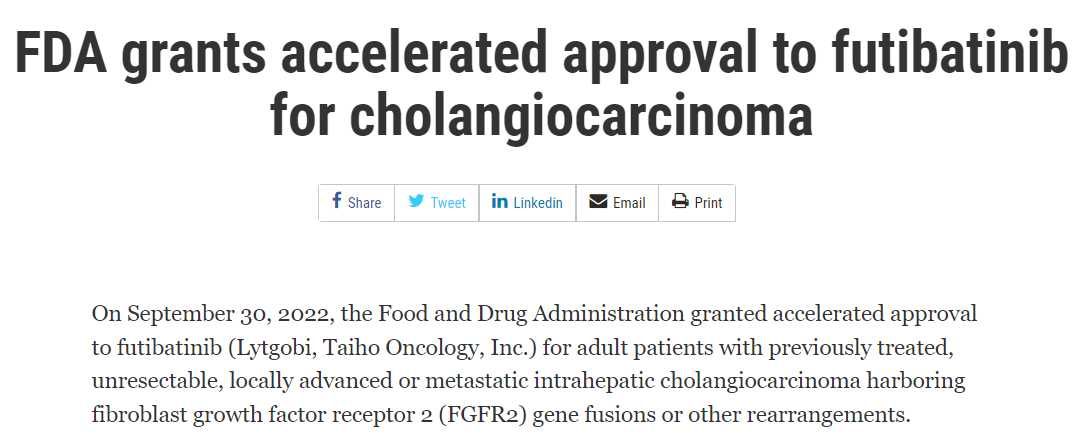On October 1, Taiho Oncology announced that the FDA has approved the marketing authorization application for the FGFR inhibitor futibatinib for the treatment of patients with locally advanced or metastatic cholangiocarcinoma harboring FGFR2 gene rearrangements, including gene fusions, who have previously received a one or more systemic treatments.
The approval is based on accelerated approval of futibatinib based on overall response rate (ORR) and duration of response (DOR) in patients with locally advanced or metastatic intrahepatic cholangiocarcinoma. In February 2021, the FDA granted the drug breakthrough therapy designation for the same indication.
Cholangiocarcinoma is a rare malignancy that mainly occurs in people over the age of 65. Approximately 10-16% of patients with cholangiocarcinoma develop FGFR2 gene rearrangements or fusions that lead to tumor proliferation. After failure of gemcitabine/cisplatin therapy, patients lack effective treatment methods, usually the objective response rate (ORR) of second-line therapy is less than 10%, the median progression-free survival (mPFS) is about 3 months, and the median overall survival (mOS) of 6-7 months.
Futibatinib is an oral, highly selective, irreversible tyrosine kinase inhibitor with good inhibitory effect on FGFR1-4. The drug inhibits FGFR-mediated signaling by binding to the ATP-binding pockets of FGFR1-4, thereby reducing tumor cell proliferation and accelerating the death of FGFR-mutated tumor cells.
The approval is based on the pivotal Phase IIb FOENIX-CCA2 study, which enrolled 103 previously treated patients with locally advanced or metastatic intrahepatic cholangiocarcinoma with FGFR2 gene rearrangements, including gene fusions. These patients received futibatinib (20 mg) once daily until disease progression or unacceptable toxicity.
The results showed that the ORR assessed by an independent review committee according to RECIST v1.1 was 42% (95% CI: 32, 52), and the study met the primary endpoint. In addition, the median duration of response was 9.7 months (95% CI: 7.6, 17.1), with 72% of patients achieving sustained responses for more than 6 months, with a disease control rate of 82.5%. mPFS was 9.0 months and mOS was 21.7 months.
Futibatinib was safe and well-tolerated. Common treatment-related adverse events were hyperphosphatemia (85%), alopecia (33%), and dry mouth (30%). The only serious adverse event reported by patients was migraine ( 1.9%).
Futibatinib is also expanding into multiple indications, including urothelial cancer, breast cancer, gastric cancer and non-small cell lung cancer.
In the field of cholangiocarcinoma, three drugs have been approved for marketing before. In April 2020, Incyte’s FGFR1-3 inhibitor pemitinib received accelerated approval from the FDA, making it the world’s first targeted therapy for cholangiocarcinoma. Innovent Bio entered into a partnership with Incyte in 2018 to gain its development and commercialization rights in China. In March of this year, pemitinib was approved by the NMPA for the second-line treatment of cholangiocarcinoma.
In May 2021, the second cholangiocarcinoma-targeted drug, Infigratinib, was launched, and Liantuo Bio was responsible for the development and commercialization of Infigratinib in China.
Servier’s avonib was approved by the FDA in August 2021 for previously treated patients with IDH1-mutated locally advanced or metastatic cholangiocarcinoma. CStone has exclusive rights to the drug in China and Singapore.









